#modern home the netherlands
Photo


Ingek73 found this unique home in the Netherlands that reminds me of the wedge of a rounded bombe cake. Built in 2010, this modern home has been on the market for 5 mos. € 2,950,000 ($3.072M)

As soon as I saw the entrance, I loved it- The wood and the stairs, it’s all so pretty and unique.
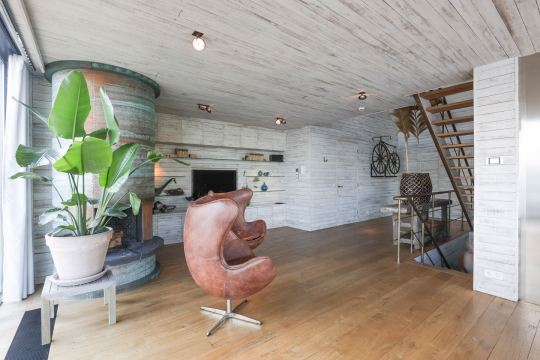
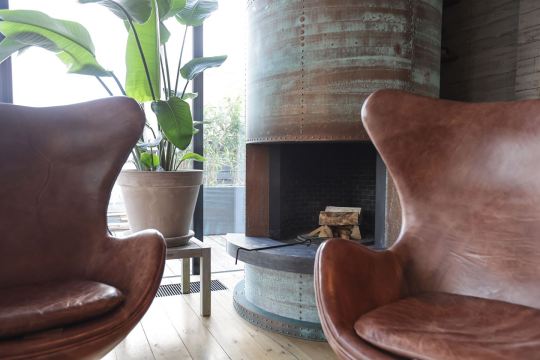
The round fireplace has bolts, so it looks like it may be metal strips.


From the spacious living room you can go out to the deck or look at the water.


If you’re into modern, you can’t get any sleeker than this kitchen. Love the stainless steel backsplash.

Look at all the storage along the wall to the stairs to the bedrooms.

This home is made for large families.

It doesn’t look this large from the outside.

This must be a guest room, but look at the big closet.

Beautiful bath.

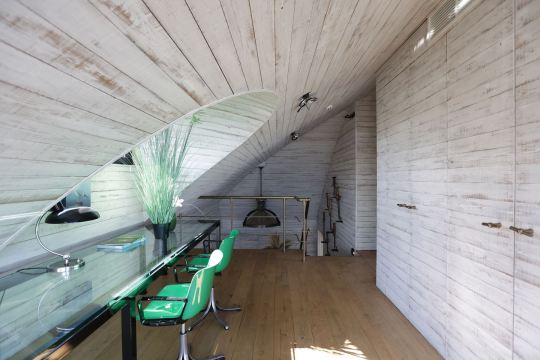
Look at where the main stairs in the entrance lead- isn’t this a unique office area?

The main bd. is just gorgeous- look at the view.

The en suite has a fabulous black tub and sink.

I don’t know what this is- is it a shower for when you come in from outdoors? Maybe a room for gardening?
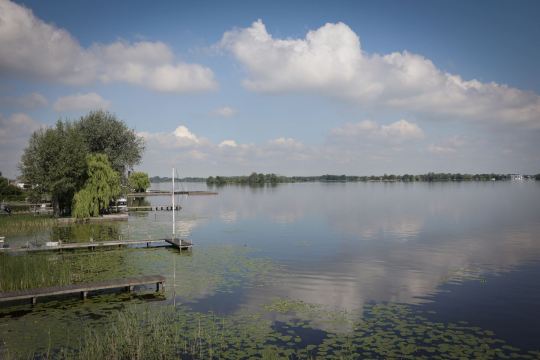
Has a dock for a boat or fishing.
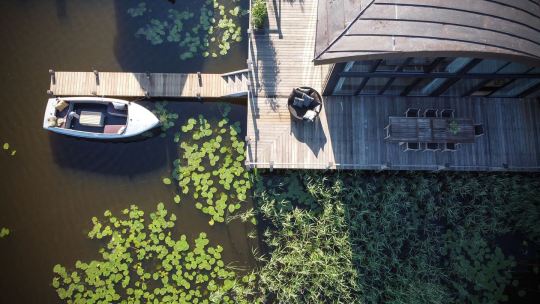

Bring the boat right up to the front door. Look at all the lily pads.
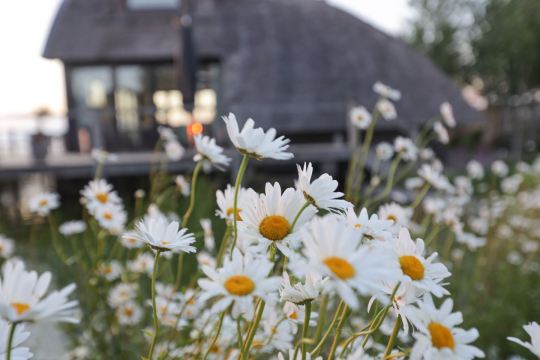

What a beautiful property, and it has the sweetest daisy garden.
https://www.funda.nl/koop/loosdrecht/huis-42858476-nieuw-loosdrechtsedijk-272/
222 notes
·
View notes
Text







Villa Broeck, the Netherlands - Bedaux de Brouwer Architecten
#Bedaux de Brouwer Architecten#architecture#design#building#modern architecture#interiors#minimal#house#house design#modern#contemporary architecture#home#home design#cool houses#beautiful home#interior design#brick#brick architecture#brick house#contemporary#garden#window#stairs#courtyard#living room#netherlands#design blog#architectural photography#suburb#pitched roof
166 notes
·
View notes
Text
This Week on The Nordroom

A Swedish Apartment with a Tiny Terracotta Brown Bedroom

A Stockholm Apartment with Bright Green Color Accents

A Victorian House where the Kitchen is the Heart of the Home

A Classic Stockholm Apartment with Floral Wallpaper

a warm atmosphere in a historic dutch villa

A Light London Maisonette in a Former Artist’s Studio

A Modern Garage Conversion in The Netherlands

A Stylish White deVOL Kitchen in an Edwardian House


Ochre Yellow and Green Tones in a Cozy Welsh Cottage
325 notes
·
View notes
Text
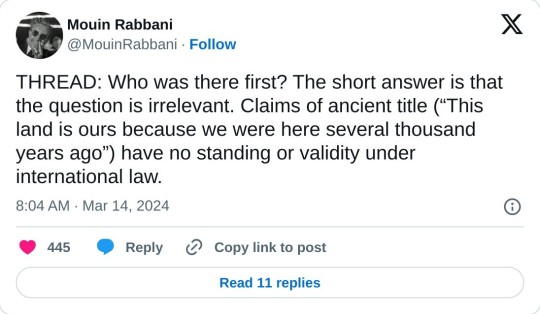
twitter thread by Mouin Rabbani
March 14, 2024
Who was there first? The short answer is that the question is irrelevant. Claims of ancient title (“This land is ours because we were here several thousand years ago”) have no standing or validity under international law.
For good reason, because such claims also defy elementary common sense. Neither I nor anyone reading this post can convincingly substantiate the geographical location of their direct ancestors ten or five or even two thousand years ago.
If we could, the successful completion of the exercise would confer exactly zero property, territorial, or sovereign rights.
As a thought experiment, let’s go back only a few centuries rather than multiple millennia. Do South Africa’s Afrikaners have the right to claim The Netherlands as their homeland, or even qualify for Dutch citizenship, on the basis of their lineage?
Do the descendants of African-Americans who were forcibly removed from West Africa have the right to board a flight in Atlanta, Port-au-Prince, or São Paolo and reclaim their ancestral villages from the current inhabitants, who in all probability arrived only after – perhaps long after – the previous inhabitants were abducted and sold into slavery half a world away?
Do Australians who can trace their roots to convicts who were involuntarily transported Down Under by the British government have a right to return to Britain or Ireland and repossess homes from the present inhabitants even if, with the help of court records, they can identify the exact address inhabited by their forebears? Of course not.
In sharp contrast to, for example, Native Americans or the Maori of New Zealand, none of the above can demonstrate a living connection with the lands to which they would lay claim.
To put it crudely, neither nostalgic attachment nor ancestry, in and of themselves, confer rights of any sort, particularly where such rights have not been asserted over the course of hundreds or thousands of years.
If they did, American English would be the predominant language in large parts of Europe, and Spain would once again be speaking Arabic.
Nevertheless, the claim of ancient title has been and remains central to Zionist assertions of not only Jewish rights in Palestine, but of an exclusive Jewish right to Palestine.
For the sake of argument, let’s examine it. If we put aside religious mythology, the origin of the ancient Israelites is indeed local.
In ancient times it was not unusual for those in conflict with authority or marginalized by it to take to the more secure environment of surrounding hills or mountains, conquer existing settlements or establish new ones, and in the ultimate sign of independence adopt distinct religious practices and generate their own rulers. That the Israelites originated as indigenous Canaanite tribes rather than as fully-fledged monotheistic immigrants or conquerors is more or less the scholarly consensus, buttressed by archeological and other evidence. And buttressed by the absence of evidence for the origin stories more familiar to us.
It is also the scholarly consensus that the Israelites established two kingdoms, Judah and Israel, the former landlocked and covering Jerusalem and regions to the south, the latter (also known as the Northern Kingdom or Samaria) encompassing points north, the Galilee, and parts of contemporary Jordan. Whether these entities were preceded by a United Kingdom that subsequently fractured remains the subject of fierce debate.
What is certain is that the ancient Israelites were never a significant regional power, let alone the superpower of the modern imagination.
There is a reason the great empires of the Middle East emerged in Egypt, Mesopotamia, Persia, and Anatolia – or from outside the region altogether – but never in Palestine.
It simply lacked the population and resource base for power projection. Jerusalem may be the holiest of cities on earth, but for almost the entirety of its existence, including the period in question, it existed as a village, provincial town or small city rather than metropolis.
Judah and Israel, like the neighboring Canaanite and Philistine entities during this period, were for most of their existence vassal states, their fealty and tribute fought over by rival empires – Egyptians, Assyrians, Babylonians, etc. – rather than extracted from others.
Indeed, Israel was destroyed during the eighth century BCE by the Assyrians, who for good measured subordinated Judah to their authority, until it was in the sixth century BCE eliminated by the Babylonians, who had earlier overtaken the Assyrians in a regional power struggle.
The Babylonian Exile was not a wholesale deportation, but rather affected primarily Judah’s elites and their kin. Nor was there a collective return to the homeland when the opportunity arose several decades later after Cyrus the Great defeated Babylon and re-established a smaller Judah as a province of the Persian Achaemenid empire. Indeed, Mesopotamia would remain a key center of Jewish religion and culture for centuries afterwards.
Zionist claims of ancient title conveniently erase the reality that the ancient Israelites were hardly the only inhabitants of ancient Palestine, but rather shared it with Canaanites, Philistines, and others.
The second part of the claim, that the Jewish population was forcibly expelled by the Romans and has for 2,000 years been consumed with the desire to return, is equally problematic.
By the time the Romans conquered Jerusalem during the first century BCE, established Jewish communities were already to be found throughout the Mediterranean world and Middle East – to the extent that a number of scholars have concluded that a majority of Jews already lived in the diaspora by the time the first Roman soldier set foot in Jerusalem.
These communities held a deep attachment to Jerusalem, its Temple, and the lands recounted in the Bible. They identified as diasporic communities, and in many cases may additionally have been able to trace their origins to this or that town or village in the extinguished kingdoms of Israel and Judah. But there is no indication those born and bred in the diaspora across multiple generations considered themselves to be living in temporary exile or considered the territory of the former Israelite kingdoms rather than their lands of birth and residence their natural homeland, any more than Irish-Americans today feel they properly belong in Ireland rather than the United States.
Unlike those taken in captivity to Babylon centuries earlier, there was no impediment to their relocation to or from their ancestral lands, although economic factors appear to have played an important role in the growth of the diaspora.
By contrast, those traveling in the opposite direction appear to have done so, more often than not, for religious reasons, or to be buried in Jerusalem’s sacred soil.
Nations and nationalism did not exist 2,000 years ago.
Nor Zionist propagandists in New York, Paris, and London incessantly proclaiming that for two millennia Jews everywhere have wanted nothing more than to return their homeland, and invariably driving home rather than taking the next flight to Tel Aviv.
Nor insufferably loud Americans declaring, without a hint of irony or self-awareness, the right of the Jewish people to Palestine “because they were there first”.
Back to the Romans, about a century after their arrival a series of Jewish rebellions over the course of several decades, coupled with internecine warfare between various Jewish factions, produced devastating results.
A large proportion of the Jewish population was killed in battle, massacred, sold into slavery, or exiled. Many towns and villages were ransacked, the Temple in Jerusalem destroyed, and Jews barred from entering the city for all but one day a year.
Although a significant Jewish presence remained, primarily in the Galilee, the killings, associated deaths from disease and destitution, and expulsions during the Roman-Jewish wars exacted a calamitous toll.
With the destruction of the Temple Jerusalem became an increasingly spiritual rather than physical center of Jewish life. Jews neither formed a demographic majority in Palestine, nor were the majority of Jews to be found there.
Many of those who remained would in subsequent centuries convert to Christianity or Islam, succumb to massacres during the Crusades, or join the diaspora. On the eve of Zionist colonization locally-born Jews constituted less than five per cent of the total population.
As for the burning desire to return to Zion, there is precious little evidence to substantiate it. There is, for example, no evidence that upon their expulsion from Spain during the late fifteenth century, the Sephardic Jewish community, many of whom were given refuge by the Ottoman Empire that ruled Palestine, made concerted efforts to head for Jerusalem. Rather, most opted for Istanbul and Greece.
Similarly, during the massive migration of Jews fleeing persecution and poverty in Eastern Europe during the nineteenth century, the destinations of choice were the United States and United Kingdom.
Even after the Zionist movement began a concerted campaign to encourage Jewish emigration to Palestine, less than five per cent took up the offer. And while the British are to this day condemned for limiting Jewish immigration to Palestine during the late 1930s, the more pertinent reality is that the vast majority of those fleeing the Nazi menace once again preferred to relocate to the US and UK, but were deprived of these havens because Washington and London firmly slammed their doors shut.
Tellingly, the Jewish Agency for Israel in 2023 reported that of the world’s 15.7 million Jews, 7.2 million – less than half – reside in Israel and the occupied Palestinian territories.
According to the Agency, “The Jewish population numbers refer to persons who define themselves as Jews by religion or otherwise and who do not practice another religion”.
It further notes that if instead of religion one were to apply Israel’s Law of Return, under which any individual with one or more Jewish grandparent is entitled to Israeli citizenship, only 7.2 of 25.5 million eligible individuals (28 per cent) have opted for Zion.
In other words, “Next Year in Jerusalem” was, and largely remains, an aspirational religious incantation rather than political program. For religious Jews, furthermore, it was to result from divine rather than human intervention.
For this reason, many equated Zionism with blasphemy, and until quite recently most Orthodox Jews were either non-Zionist or rejected the ideology altogether.
Returning to the irrelevant issue of ancestry, if there is one population group that can lay a viable claim of direct descent from the ancient Israelites it would be the Samaritans, who have inhabited the area around Mount Gerizim, near the West Bank city of Nablus, without interruption since ancient times.
Palestinian Jews would be next in line, although unlike the Samaritans they interacted more regularly with both other Jewish communities and their gentile neighbors.
Claims of Israelite descent made on behalf of Jewish diaspora communities are much more difficult to sustain. Conversions to and from Judaism, intermarriage with gentiles, absorption in multiple foreign societies, and related phenomena over the course of several thousand years make it a virtual certainty that the vast majority of Jews who arrived in Palestine during the late 19th and first half of the 20th century to reclaim their ancient homeland were in fact the first of their lineage to ever set foot in it.
By way of an admittedly imperfect analogy, most Levantines, Egyptians, Sudanese, and North Africans identify as Arabs, yet the percentage of those who can trace their roots to the tribes of the Arabian Peninsula that conquered their lands during the seventh and eighth centuries is at best rather small.
Ironically, a contemporary Palestinian, particularly in the West Bank and Galilee, is likely to have more Israelite ancestry than a contemporary diaspora Jew.
The Palestinians take their name from the Philistines, one of the so-called Sea Peoples who arrived on the southern coast of Canaan from the Aegean islands, probably Crete, during the late second millennium BCE.
They formed a number of city states, including Gaza, Ashdod, and Ashkelon. Like Judah and Israel they existed primarily as vassals of regional powers, and like them were eventually destroyed by more powerful states as well.
With no record of their extermination or expulsion, the Philistines are presumed to have been absorbed by the Canaanites and thereafter disappear from the historical record.
Sitting at the crossroads between Asia, Africa, and Europe, Palestine was over the centuries repeatedly conquered by empires near and far, absorbing a constant flow of human and cultural influences throughout.
Given its religious significance, pilgrims from around the globe also contributed to making the Palestinian people what they are today.
A common myth is that the Palestinian origin story dates from the Arab-Muslim conquests of the seventh century. In point of fact, the Arabs neither exterminated nor expelled the existing population, and the new rulers never formed a majority of the population.
Rather, and over the course of several centuries, the local population was gradually Arabized, and to a large extent Islamized as well.
So the question as to who was there first can be answered in several ways: “both” and “irrelevant” are equally correct.
Indisputably, the Zionist movement had no right to establish a sovereign state in Palestine on the basis of claims of ancient title, which was and remains its primary justification for doing so.
That it established an exclusivist state that not only rejected any rights for the existing Palestinian population but was from the very outset determined to displace and replace this population was and remains a historical travesty.
That it as a matter of legislation confers automatic citizenship on millions who have no existing connection with the land but denies it to those who were born there and expelled from it, solely on the basis of their identity, would appear to be the very definition of apartheid.
The above notwithstanding, and while the Zionist claim of exclusive Israeli sovereignty in Palestine remains illegitimate, there are today several million Israelis who cannot be simply wished away.
A path to co-existence will need to be found, even as the genocidal nature of the Israeli state, and increasingly of Israeli society as well, makes the endeavor increasingly complicated.
The question, thrown into sharp relief by Israel’s genocidal onslaught on the Palestinian population of the Gaza Strip, is whether co-existence with Israeli society can be achieved without first dismantling the Israeli state and its ruling institutions.
258 notes
·
View notes
Text

How Hadrian’s Wall is Revealing a Hidden Side of Roman History
A party invitation. A broken flipflop. A wig. Letters of complaint about road conditions, and an urgent request for more beer.
It sounds like the aftermath of a successful spring break, but these items are nearly 2,000 years old.
They’re just some of the finds from Hadrian’s Wall – the 73-mile stone wall built as the northwestern boundary of the Roman Empire, sealing off Britannia (modern-day England and Wales) from Caledonia (essentially today’s Scotland).
While most of us think of Pompeii and Herculaneum if we’re thinking of everyday objects preserved from ancient Rome, this outpost in the wild north of the empire is home to some of the most extraordinary finds.
“It’s a very dramatic stamp on the countryside – there’s nothing more redolent of saying you’re entering the Roman empire than seeing that structure,” says Richard Abdy, lead curator of the British Museum’s current exhibition, Legion, which spotlights the everyday life of Roman soldiers, showcasing many finds from Hadrian’s Wall in the process. A tenth of the Roman army was based in Britain, and that makes the wall a great source of military material, he says.
But it’s not all about the soldiers, as excavations are showing.
A multicultural melting pot

Hadrian, who ordered the wall to be built in 122CE after a visit to Britannia, had a different vision of empire than his predecessors, says Frances McIntosh, curator for English Heritage’s 34 sites along Hadrian’s Wall.
“All the emperors before him were about expanding the empire, but Hadrian was known as the consolidator,” she says. He relinquished some of the territory acquired by his predecessor Trajan, and “decided to set the borders” – literally, in some cases, with wooden poles at sites in Germany, or with stone in Britannia. Where those poles rotted thousands of years ago, the wall is still standing: “A great visual reminder” of the Roman empire, says McIntosh.
It’s not just a wall. There’s a castle every mile along, and turrets at every third-of-a-mile point, with ditches and banks both north and south. “You can imagine the kind of impact that would have had, not just on the landscape but on the people living in the area,” says McIntosh.
And thanks to the finds from the wall, we know a surprising amount about those people.
Although historians have long thought of army outposts as remote, male-dominant places, the excavations along the wall show that’s not the case. Not only were soldiers accompanied by their families, but civilians would settle around the settlements to do business. “ You can almost see Housesteads as a garrison town,” says McIntosh. “There were places you could go for a drink and so on.”
The Roman rule of thumb was not to post soldiers in the place they came from, because of the risk of rebellion. That meant Hadrian’s Wall was a cultural melting point, with cohorts from modern-day Netherlands, Spain, Romania, Algeria, Iraq, Syria – and more. “It was possibly more multicultural because it was a focus point,” says McIntosh, who says that the surrounding community might have included traders from across the empire.
Soldiers were split into two groups. Legionaries were Roman citizens from Italy, who had more rights than other soldiers and imported olive oil, wine and garum (a sauce made from decomposing fish).
They worked alongside auxiliaries – soldiers from conquered provinces, who had fewer rights, but could usually acquire citizenship after 25 years of service.
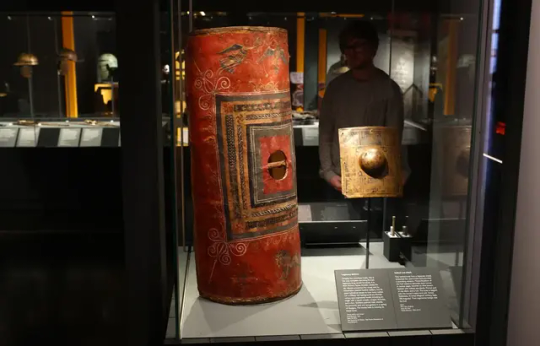
Soldiers carved their names and regiments on stones to show which part of the wall they built – around 50 of them are on display at Chesters fort.
But the wall shows that women and children were equally present.
McIntosh says that pottery brought to the camps – from the Low Countries and North Africa – shows that the soldiers “brought their families, who cooked in traditional style.” Archaeologists have found what seems to be an ancient tagine for North African-style cooking.
A tombstone from Arbeia fort for a woman named Regina shows she was a freed slave from southern Britain who was bought by – and married to – a Syrian soldier.
Another woman buried at Birdoswald fort was laid to rest with chainmail that appears to be from modern-day Poland. “Perhaps she married someone in the army,” says McIntosh, who calls the wall a “melting pot of people from all over the world under the banner of the army.”
“They brought their own religions, as well as worshipping Roman gods and adopting local deities,” she adds. At Carrawburgh, a temple to Mithras – an originally Persian deity – sat near a spring with a shrine to a local water spirit.
‘Wretched little Brits’
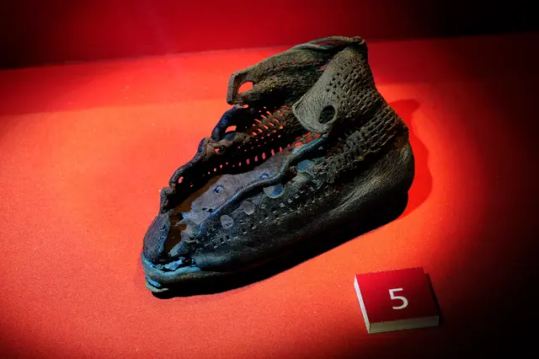
Some of the most extraordinary finds from the Roman empire are coming from one site on Hadrian’s Wall: Vindolanda. Here, archaeologists have found a wealth of organic remains because of what curator Barbara Birley calls the “unusual conditions onsite.”
At Vindolanda there are the remains of at least nine forts over 14 levels. “When the Romans would leave, they would knock down timber forts, and cover the area with turf and clay, sealing the layers underneath,” she says.
“Because it happened so many times, the bottom five or six layers are sealed in anaerobic conditions, so things don’t decay. When we get down there, we get wooden objects, textiles, anything organic.”
Vindolanda has the largest collection of Roman textiles from a single site in western Europe, as well as the largest leather collection of any site in the Roman empire – including 5,000 shoes, and even a broken leather flip-flop. “We probably had a population of 3,000 to 6,000 depending on the period, so 5,000 is a lot,” says Birley. For Abdy, the shoes evoke the conditions of the wet borderlands. “Women’s and children’s shoes are hobnailed – you needed it in the mucky frontier dirt tracks. They’re very evocative.”
There’s even a wig made from a local plant, hair moss, which is said to repel midges – the scourge of Scotland during the summer. A centurion’s helmet is also crested with hairmoss – the ancient equivalent of spraying yourself with insect repellent.
The first woman to write in Latin
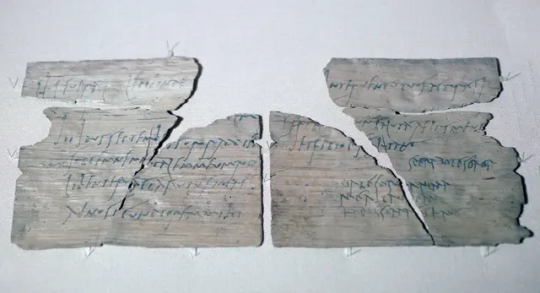
One of the most famous finds is the trove of wooden writing tablets – the largest found anywhere.
“They give a snapshot of what life was actually like,” says Birley. “We understand so much more from written correspondence than from ‘stuff,’ and, archaeologically, it’s the stuff that usually survives – things like metals and ceramics.
“These were written in ink, not on a wax stylus tablet, and we believe they were used for what we’d put in emails: ‘The roads are awful,’ ‘The soldiers need more beer.’ Everyday business.”
The tablets – or “personal letters” as Birley describes them – were found on the site of a bonfire when the ninth cohort of Batavians (in the modern-day Netherlands) were told to move on.
“They had a huge bonfire and lots of letters were chucked in the fire. Some have been singed – we think it may have rained,” she says. One of them calls the locals “Britunculi” – “wretched little Brits.” Another talks about an outbreak of pinkeye. One claims that the roads are too bad to send wagons; another laments that the soldiers have run out of beer.

Among the 1,700 letters are 20 that mention a woman called Sulpicia Lepidina. She was the wife of the commander of the garrison, and seems to have played a crucial role. There’s a letter to her from another woman, Paterna, agreeing to send her two medicines, one a fever cure.
Birley says it’s similar to today. “If you’re a group of moms, still today we say, ‘Do you have the Calpol?’ It’s very human.” For Abdy, it’s a sign that women were traders. “She’s clearly flogging her medicines,” he says. “It’s really great stuff.”
Another tablet is an invite from Claudia Severa, the wife of another commander at a nearby camp. It’s an invitation to a birthday party. Under the formal invitation, presumably written by a scribe, is a scrawl in another hand: “I shall expect you, sister. Farewell, sister, my dearest soul.”
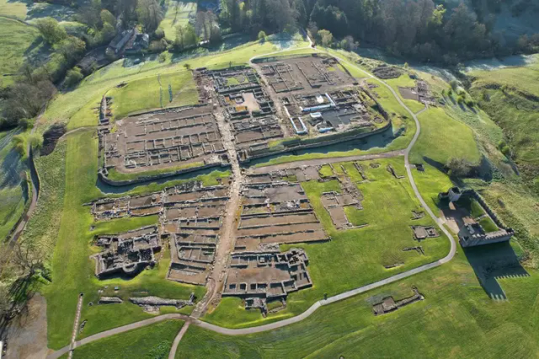
Presumably written by Claudia herself, it is thought to be the earliest example of a woman’s handwriting in Latin.
Without the organic finds – the shoes and the letters that indisputably belonged to women, unlike jewellery or weaving equipment – it’s difficult to prove conclusively that women lived in significant numbers. Vindolanda “illustrate the missing gaps,” says Abdy.
For Birley, they prove that women were as crucial a part of army communities as men. “Before the Lepidina tablets were found we didn’t really understand the interactions between the soldiers and their wives,” she says. Another tablet is written by what is thought to be a Spanish standard-bearer’s common-law wife, ordering military equipment for her partner.
“The Vindolanda collection is showing that there weren’t just camp followers and prostitutes; women were part of everyday life, and contributing to the military community in many ways,” says Birley.

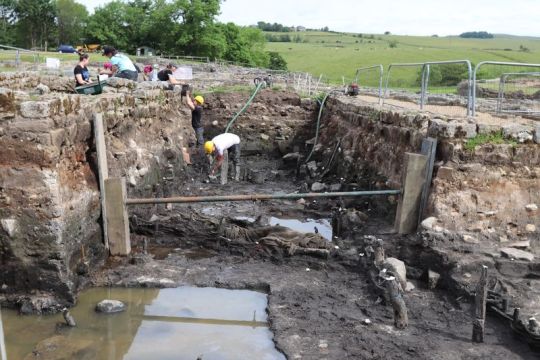
Abdy says that Hadrian’s Wall is interesting because the resident women span “all classes of society,” from Regina – the dead freedwoman, who would have been “bottom of the heap” – to the trader Paterna and the noblewoman Lepidina.
And of course, there’s the wall itself.
“In the Netherlands and Germany the finds are often stunning and better preserved – you go to museums and are bowled over. But in terms of structural remains, Hadrian’s Wall must be among the best,” says McIntosh, modestly, of her site.
Abdy agrees: “I can’t think of many symbols so redolent of imperial will than that wall.”
By Julia Buckley.

#How Hadrian’s Wall is Revealing a Hidden Side of Roman History#Hadrian’s Wall#emperor hadrian#northwestern boundary of the Roman Empire#Britannia#Caledonia#roman legions#ancient artifacts#archeology#archeolgst#history#history news#ancient history#ancient culture#ancient civilizations#roman history#roman empire#long post#long reads
106 notes
·
View notes
Text
🎁🎄Never Better Than At Christmas - Max Verstappen
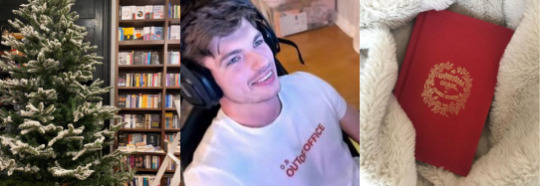
<word count - 3484>
You lived in a small, snow-covered town in the heart of the Netherlands, and you were known throughout the town for your absolute adoration of Christmas. You always decorated your cozy little house with twinkling lights, ornaments and a perfectly adorned tree.
You also worked at the bookstore, where you spent your days surrounded by the magic of stories. You spent every Monday night, reading to the children of the village, and you helped out in the school library as well.
On one snowy evening, just a few mere days before Christmas, a man walked into the bookstore, seemingly seeking refuge from the bitter cold outside. You were eager to share your love for literature, so you approached the man.
"Excuse me?" you asked, standing beside him. He had a few sprinkles of white on his coat shoulders, a few sitting atop his blonde hair. "Can I help you?" you further asked, once you had his attention.
"I was just walking by, and this place looked pretty warm, I hope you don't mind," he kindly smiled, taking in your appearance. You looked as cozy as you possibly could, with black turtleneck sweater and a thick jacket over the top.
"Of course, no problem," you smiled, glad to have a visitor at this time. Nobody really came to the store past 5pm, but you were still open till eight any way. It was quiet, and it was the perfect place for you to read all of the books you could possibly want to indulge in.
"It's a really nice store you've got here, the Christmas decorations are gorgeous," he complimented, and you couldn't help but blush. You took great pride in decorating your favourite place for your favourite holiday, and it was nice that someone noticed.
"Thank you, Christmas is my absolute favourite holiday in the whole world," you beamed as he nodded in approval.
"I completely agree with you, there's nothing quite like the magic of Christmas, is there?" he said, and you felt like you were falling in love already.
"There really isn't," you agreed, watching as his eyes wandered around the space. Bookshelves upon bookshelves lining the walls, filled to the brim with old classics and modern works of literature. There was a Christmas tree by the till, and the whole store had warm, twinkling lights strung up.
"Can I get you a drink? I can do tea, coffee, hot chocolate, whatever you want, really," you offered, wanting to learn more about the stranger who had stumbled into your shop.
"A hot chocolate sounds great, thank you."
"Take a seat and I'll have it ready in a few minutes," you told him, pointing to the two arm chairs that were tucked away in the corner. That was where you would sit and read to the children on a Monday night, while they all sat sipping hot chocolates as they intently listened to you.
You disappeared into the back to your tiny kitchen, which consisted of a small stove and a kettle, made complete with a mini fridge where you kept the milk. You warmed it up over the stove, before tipping the rich chocolate powder into it.
Pouring it into two mugs, you topped it off with whipped cream and the mini marshmallows that you absolutely loved. Walking back out into the shop, the mugs clutched in your hand, you saw the blonde man sat in one of the armchairs, and he had conveniently left your favourite one vacant for you.
"Thank you," he said, taking one of the mugs out of your hands and leaning back in the chair. Something about the shop felt comforting, and homely. He couldn't quite tell whether it was the atmosphere, the lighting or the strange feeling of familiarity.
"What's your name, if you don't mind me asking?" you queried, sitting down in the armchair next to the stranger's. You held the mug in your hands, and it was perfectly warm to the touch.
"Max, you?" he said, and you could finally put a name to the face.
"Y/N, it's a pleasure to meet you," you smiled, looking at him. He had this glint in his eyes, and they were just as blue as the crisp winter skies on a morning. Something about him made you feel safe, and comforted.
"The pleasure is all mine," Max said, sipping away at his hot chocolate. He had to admit, it was one of the best he had ever had, and it made him feel a warmth inside his chest.
"So what brings you here? You're not a local, I know that for sure," you chuckled.
"I was just passing through, since I'm going home to my family's for Christmas, but the snow was just too heavy to drive, so I thought I'd stop over here until it clears. I saw your shop was open, and I love books, and it looked incredibly cozy, so I figured it'd be perfect to get out of the storm for a short while," he explained, as you attentively listened.
"What kind of books do you like?" you asked, excited to delve into one of your favourite topics. You owned a bookstore after all, so you had to know what you were talking about in regards to your passion.
"I really like the classics, and A Christmas Carol has to be one of my favourites," he told you, and you could have sworn your heart skipped a beat. You stood from your chair and, once again, disappeared into the back.
You pressed the buttons on the safe in the corner and produced what you were looking for. You handed it to Max when you returned, and his eyes widened. "My prized possession, not first edition, but printed in 1845," you explained.
He gently ran his fingers over the delicate red front of the book - the 1845 print of A Christmas Carol. The edges were slightly frayed, but that was to be expected of a near on 180-year-old book. "How the hell did you get your hands on this?" he asked, flabbergasted. He had to keep on running his fingers over it, just to make sure it was real.
"My Dad was a collector of the classics, this is the only one of his that isn't in a museum at the moment," you explained, the look on his face being completely priceless. It was like a child opening their dream gift on Christmas morning. That pure, innocent joy that couldn't be compared to anything else.
"Can I open it?"
"Books are meant to be read," you nodded, watching the care he took as he gently flipped the pages. His hands were so careful with the aged, frail pages, his eyes scanning over the words that he had read so many times over, but it was so much better reading them from what might as well have been an original copy.
"It's beautiful, absolutely beautiful," he stuttered, unable to take his eyes off the object in his hands. "Thank you for letting me see it," he added, handing it back to you so that you could put it back in its safe place.
"Stories are meant to be shared, it'd be selfish if I didn't," you smiled, peeking out of the window, seeing snowflakes aggressively fly through the air, a few hitting the glass panes. The wind rattled the door every now and then, as if it were trying to infiltrate the warm, safe space with its bitingly cold fingers.
"I don't think the storm is letting up anytime soon, do you have a place to stay for the night?" you asked, seemingly concerned about what Max was going to do.
"I didn't really think about that, to be honest..." he realised, thinking he would have to spend the night in his car, shivering as the wind kept him awake with its howling.
"There's a spare room at my place, if you would be comfortable staying, that is. No pressure if not, I'm a stranger and this is a new town, I get it," you rambled.
"If you're happy with it, then I'd be very grateful to stay for the night," he smiled, glad that you were trusting a stranger from outside of your town to stay in your house.
"Well then, let me lock up and we can head out," you smiled, retrieving your keys from the counter and starting to lock the bookstore up for the night. Once you were done, you led Max down some side streets, that were sheltered from the wind by the buildings.
"Goodnight Max, I'll be next door if you need me," you said, closing the door to the spare room behind you as you left Max to settle and get some sleep. All he could think about for a short while was how grateful he was for the storm, since it meant he could meet you and get to know you.
The next morning, you awoke to people shovelling snow from the roads and pavements in order to allow people to actually get around the village. You found Max in the kitchen, stood at the stove. "Good morning, I figured I could make you breakfast as a small thank you," he said as he noticed you walk in.
Your heart was fluttering as you and Max ate breakfast together, little progress being made on the roads outside. "I don't think you're going to be able to drive for a little while," you said, and Max could only chuckle in agreement.
The roads were still blanketed by inches of snow, so driving on them was simply an idiotic idea. "How about we go for a walk, I can show you around?" you offered, wanting to show off more of your town to the man you had grown so fond of in such a short amount of time.
"Sounds wonderful," Max smiled, ready to see your town. Once you were done with breakfast and had cleared away, the pair of you shrugged your coats over your shoulders and ventured out into the snowy landscape.
The snow crunched under your feet, and glittered under the high winter sun. You showed him some of your favourite places, and finally took him to the antique shop that you frequented. Despite it only being a small town, there were many treasures that people kept until they no longer had the use for them, and brought them here.
It was very resemblant of your book store, and Max instantly adored it. As you wandered around the store, Max let his eyes feast on all of the old wonders that it contained. Their collection spanned from furniture to old trinkets from years gone by.
But, the section that intrigued the pair of you the most had to be the jewellry. They had pieces that were seemingly timeless, and they had every kind of piece that one's heart could desire: brooches, earrings, bracelets, necklaces, rings, anklets. You name it, they had something of it.
Your eyes were particularly captured by a golden locket, the piece being placed in the display cabinet open, revealing the two spaces that two photos could be placed in. "Pretty, isn't it?" Max said, standing beside you as you gazed at it.
"It really is," you nodded, moving on from the cabinet before the locket could steal your heart just as quickly as Max had. Max had already made up his mind of what he was going to do before he left, but he needed to send you away so he could make it somewhat of a surprise.
As you stepped outside of the shop, Max stopped and tried to bring on his Oscar winning acting skills, of which he felt he greatly lacked. "Damn, I think I left my keys on one of the displays, I'll go and get them," he lied, not having a clue if he was being convincing or not.
"Do you want me to come and help you look?" you offered, not spotting the pretty obvious lie.
"No, I know where they are, but thank you," he said, a little too quickly before walking back into the store and heading straight to the counter. The clerk was more than happy to sell him the locket, since they were getting pretty full of items.
He had it, and now he just had to get a couple more things done with it, and then he could gift it to you. "Am I alright to stay at yours for another night? I don't think the roads are clear yet," he said, glad to be hopefully staying longer with you.
"Yeah, you can stay for as long as you need," you smiled, grateful that the roads weren't being cleared. You didn't want Max to go just yet, since you were thoroughly enjoying the time spent with him. You had gotten used to having him around for the past day and a bit, and you didn't want that to end.
Eventually, you headed home and lit the fire, but Max said he was going to go to bed early, just in case he could leave the next day and would have a long drive ahead of him. You sat in front of the fire, the flames casting shadows on the walls with a crimson glow on the space.
A newer copy of A Christmas Carol was sat on the coffee table, and you had started re-reading it since Max had been there. You mentally scolded him for partially ruining the book for you, since you would think of him every time you read the book, or looked at your prized 1845 copy.
Now, A Christmas Carol and Max were two things that popped up simultaneously in your brain, and there was nothing you could do about it. While you were lost in your thoughts, you failed to notice Max slipping out of the back door and out onto the snowy pavements, yet again.
He went to the jewellry shop, leaving the locket there while he went to find someone who could print photos. It took a while, but he eventually found a printing machine in the convenience store. He also found a box for the locket, so that was convenient.
Checking over the jewellers handy work on his return, he adored what they had done. It was exactly as he had imagined, and all he had to do was place the photo in, and it was all set for you. Opening the back door again, he was hit with the warmth from the fire, and silence. Nothing could be hear apart from the soft crackle of the embers.
He saw you, still in the same exact spot on the couch, but you didn't move an inch. He headed upstairs to get ready for bed, but he thought it would be good to check on you. You were still in the same position, and as he approached, you stayed completely still.
He rounded the sofa, quickly seeing why you hadn't moved. You were fast asleep, your book open in your lap as your lips were parted with soft breaths escaping them. He took the book from your lap, spotting that you were reading A Christmas Carol, and it was coincidentally on a very topical page.
He put it to the side, and draped a blanket over you so that you'd be warm once the fire died out. He lent over and gently kissed you on the forehead, whispering a soft 'Goodnight' as he left you sleeping.
Unfortunately for the both of you, the roads were fully cleared, and Max no longer had an excuse to stay. He stood outside your door, his bag in one hand as he took it all in for one last time. "It's been lovely spending time with you, Max," you said, trying to hide your sadness.
"It's been great spending time with you as well, thank you so much for letting me stay," he smiled, gazing at you.
"You're welcome any time, Max, absolutely any time at all," you told him, fidgeting with the object behind your back. "Erm, Merry Christmas," you stuttered, thrusting it in his direction. With his free hand, he took the thing from you, expecting it.
"I figured if you liked A Christmas Carol, you'll like this," you rambled, trying to gauge a reaction. A smile tugged at the corners of his lips, before it broke out into a full grin across his face. "It's a special copy," you told him.
Flicking it open, he saw all of your annotations, all of your thoughts and feelings, as if he were inside your mind. "Wow, thank you, so much," he smiled, tucking it into his bag. It was something he would treasure forever, and Great Expectations would now be something he always correlated with you.
"I actually have something for you, but you can't open it until tomorrow, OK?" he said, pulling a small box out of his pocket.
"Thank you, Max. I won't open it until tomorrow," you promised, dropping the box into your pocket so that you wouldn't get tempted to open it.
"Merry Christmas, Y/N," he said, before throwing caution to the wind and leaning closer to you. He paused for a moment, unsure if doing what he was about to was a good idea or not, but he knew he'd regret it if he didn't.
He closed the gap between you, capturing your lips in a short, yet sickeningly sweet kiss. It only left the both of you wanting more as he pulled away, the flush on your cheeks no longer being from the cold. "I'll see you later, Y/N," Max said, sitting down into his car.
"I'll see you later, Max," you smiled, the melancholy instantly melting away like snow on a sunny day when you realised that this wasn't goodbye. Something inside you told you this wasn't goodbye, it simply was, as you had both said, a 'see you later'.
He waved as he drove off, and you stood there for a minute. It took everything you had to not pelt after him as fast as your legs could take you, stop Max's car, and give him everything you had. But, your eyes remained trained on the back of his car, until he was a dot on the horizon no more.
--
There was one present you were itching to open on Christmas day, and it was the first one you looked at as you sat in front of your Christmas tree. Taking the lid off the box your heart stopped.
Sat there, shining and glinting in the light, was the golden locket you had laid your eyes upon in the antiques store with Max. You ran your fingers over the cold, smooth gold for a moment, before opening it up.
In the left panel was the one picture you and Max had taken together, in front of your book store, both of you smiling with cold-bitten rosy cheeks. In the right panel, was an engraving. 'Never better than at Christmas'.
You flicked your eyes over to the copy of A Christmas Carol that you had on the coffee table still, and your heart swelled to at least three times the size. Tucked in the side, was a small piece of paper. All that was on it was a series of numbers, and you could barely refrain from jumping up in the air and giggling like a teenager.
You put Christmas on hold, as you punched the numbers into your phone, and instantly texted it. 'Hey Max, thank you for my present, it is absolutely beautiful, I adore it. Hope you got to your family's safe, Merry Christmas! x'
'It was the least I could do after you were so kind to me' he instantly messaged back, as if he were waiting for you. "But I didn't make it to my family's'," a voice from behind you said. You whipped your head around, only to see Max stood there.
For a moment, you just stared at him, thinking he was a figment of your imagination. "The snow got too bad further down," he smiled, opening his arms out to you. You bounded over to him, throwing your arms around his neck as you kissed him with every morsel of love you had in your body.
He held you close as you kissed, and there couldn't have been a more magical moment. As you pulled away, flushed and breathless, Max tucked a lock of loose hair behind your ear. "You OK?" he softly asked, looking deep into your eyes.
"Never better than at Christmas," you smiled, an he kissed you again, like a man starved of affection. He knew he'd never have to miss someone as much as he'd missed you during the drive away, and he knew this'd be the first of many more Christmases to remember.
A/N - Merry Christmas my loves! I have some time off, and a few things finished, so that means you guys are actually going to get some content out of me! I am working on requests and part 2s, even though I know I've been saying that for like... 2 months now. I hope you're all having a wonderful day, whether you celebrate Christmas or not, and I love you all!
Lando Christmas Special coming later, Charles Christmas Special coming in the next couple days! 💖💖
|masterlist|
#f1#formula 1#f1 x reader#f1 x you#formula 1 x reader#f1 x y/n#fluff#formula 1 x you#f1 imagines#formula 1 imagines#formula 1 x y/n#max verstappen x reader#max verstappen x you#max verstappen x y/n#max verstappen fluff#max verstappen imagines#mv1 x you#mv1#mv1 imagine#mv1 x reader#mv33 x reader#mv33 x you#mv33 x y/n#mv1 x y/n
170 notes
·
View notes
Text
sharing a space
❀ esmee brugts x USWNT!reader moving in together headcannons ❀
warning: suggestive mentions

❀⋆ Six months after Esmee and you were official, she brought up the idea of the two of you moving into an apartment together. to her surprise, you said yes immediately.
❀⋆ You’ve stayed at her apartment at least three nights a week, even before you both were official. After moving to Barcelona from the United States to join the catalan club, you felt alone as you were far away from your friends and family on the western continent. Esmee felt the same way after moving away from her home in the Netherlands. Both of you bonded over having someone who can relate to each other and their hobbies. The compatibility between the two of you was very strong, which is how you both fell in love.
❀⋆ The two of you decided to get another apartment to live in together, instead of you moving into hers and vice versa. You and the Dutch woman didn’t have to look at many apartments until the two of you found a spacious apartment that you both loved.
❀⋆ Moving in with significant others isn't easy. Esmee prefers a more modern, cool, minimalistic space while you might prefer a midcentury modern, warm, and plant filled space.
❀⋆ After coming to a compromise– you both moved into a modern minimalistic apartment to accommodate Esmee but the bright sun that shines through the bedroom windows in the morning–and the living room windows in the evening– with plants around the apartment accommodated you.
❀⋆ The new apartment has two bedrooms and two bathrooms. Obviously, Esmee and you decided to share a bedroom to sleep in. With the second bedroom— You and your girlfriend decided to make it a space where clothes, important football stuff, shoes/cleats, and necessary makeup and hair stuff will go along with a vanity. The two of you did leave a space in the smaller bedroom which had a twin bed, just in case either of you had visitors.
❀⋆ Speaking of visitors, you both had them at least once every two months. Recently, your two sisters (if you don’t have sisters, make them up hehe) came from the United States to visit you for a few days. Your oldest sister is 3 years older than you– Your other sister is your fraternal twin who's 12 minutes older than you. They were excited to meet Esmee since they’ve noticed how happy you’ve been with the dutch woman. After staying for three days in Spain, they’ve grown their own friendship with Esmee and approve of her for you.
❀⋆ Due to the small distance between Spain and the Netherlands– in comparison to Spain and the United States—Esmee usually has visitors the most. However, it's not frequent. Esmee’s brother will come to visit Esmee for a day or two which you don’t mind at all. The two of you get along and he has noticed how happy you and his sister were together.
❀⋆ Since you’ve played at Barcelona together, the two of you will usually wake up around the same time if you had morning training sessions. Sometimes, you’ll (quietly) wake up an hour before Esmee since you like to have time to chill and watch television before having to rush and get ready. Sometimes when you try to sit up from Esmee’s arms, she holds you tighter and asks you for a couple extra minutes of cuddling. That can lead into making out and more—if you get what I mean–but waking up with disruptions is never an issue.
❀⋆ Except for that one time— you had to wake up at 6am one morning to get ready for a shoot with Adidas. Throughout the shoot, you had to take pictures for their new soccer launch and film content with Barcelona Masculí player Ferran Torres (think of the shoot Vicky Lopez did with Ferran). You had an alarm that was set for 5:50am and 5:55am so you were able to wake up on time, unaware that you accidentally set an alarm for 4:30am as well. As Esmee and you were comfortably asleep, the 4:30am “apex” alarm sound on your phone erupted in the bedroom. The phone violently vibrated on your bedside table and the Dutch woman was the first to wake up from it.
❀⋆ “Y/n?” Esmee barely opened her eyes as she shook your shoulder. As your eyes opened, you heard the alarm and immediately sat up from sleeping on your side. Clicking on your phone screen, you saw the “4:31am” clock on your lockscreen which confused you. You didn’t have to wake up for an hour and a half to get ready.
❀⋆ As you turned to look at your girlfriend, you noticed that she went back to sleep. The warmth of the thick baby pink blanket that you shared with her enveloped your body which helped you lay down again. As an hour passed by, you couldn’t go back to sleep. You accepted your fate with the accidental alarm and stood up to get ready earlier than expected.
❀⋆ Besides scoring goals for Barcelona, you both loved to cook as well. When you both decide to stay inside during some evenings, Esmee and you loved to look up new recipes and try them. This can end in a disaster sometimes– with you getting flour all over the place— or Esmee accidentally burning a piece of bread— but you and your girlfriend laugh and bond about it.
❀⋆ There are times where your girlfriend and you will take showers together. Half of the time it's more intimate instead of it being sexual, but the warmth and vulnerability helps after playing on a chilly and sometimes aggressive pitch for two hours on match days.
❀⋆ Overall, moving in with Esmee was what you needed after joining Barcelona. The comfort brought you two company, love, companionship, and happiness.
<3
#barcelona femeni#esmee brugts#fc barcelona#woso community#woso fanfics#woso x reader#oranjeleeuwinnen
76 notes
·
View notes
Text
For nearly all of Jewish history people recognized that antisemitism was a reaction to the Jews and Judaism. But today, Jew-hatred is generally attributed to factors having little to do with Jews and Judaism; rather, its causes are generally held to be economic, political (the use of Jews as scapegoats), ethnic prejudice, and the psychopathology of hate - all of which dejudaize antisemitism.
Among those most committed to these dejudaizing interpretations are secular and non-Jewish Jews committed to the notion that the Jews are a people like all other peoples. Accordingly, they want to believe that antisemitism is but another form of bigotry, and that in the secular world it will die out. These individuals believe that there are no rational reasons for Jew-hatred and/or that antisemitism is a kind of societal sickness. Another reason why many modern Jews believe in these explanations for Jew-hatred, rather than in the one held by Jews for thousands of years, is simply that these explanations are more or less the only ones offered. Modern scholars tend to promote secular and universalist explanations for nearly all human problems, including, of course, antisemitism. In contrast, the traditional Jewish understanding of antisemitism has been the opposite - religious and particularist.
Among modern scholars there are a large number of Jews whose universalist worldviews make them particularly averse to the Jewish explanation of antisemitism. Indeed, they oppose any thesis, about anything, not only antisemitism, which depicts the Jews as distinctive, let alone unique. Accordingly, they have expended great efforts to prove that the Jews are not different from anyone else.
The dejudaization of antisemitism reached its nadir in the 1955 theatrical adaptation of the most famous document of the Holocaust, The Diary of Anne Frank. As an adolescent in Amsterdam, Anne Frank and her family spent more than two years hiding before being captured by the Nazis. During this time Anne Frank kept a diary that was found and published after the war.
Though raised in a secular and assimilated home, Anne came to feel during her years in hiding that there were specific Jewish reasons for the suffering she and other Jews were undergoing. On April 11, 1944, she wrote: "Who has inflicted this upon us? Who has made us Jews different from all other people? Who has allowed us to suffer so terribly up till now? It is God who has made us as we are, but it will be God, too, who will raise us up again. If we bear all this suffering and if there are still Jews left, when it is over, then Jews, instead of being doomed, will be held up as an example. Who knows, it might even be our religion from which the world and all peoples learn good, and for that reason and that reason only do we now suffer. We can never become just Netherlanders, or just English, or representatives of any country for that matter. We will always remain Jews, but we want to, too."
But Anne Frank's beliefs that Judaism was at the root of Jew-hatred and that the Jews were different were eliminated in the Broadway version of The Diary of Anne Frank. The authors, Alfred and Frances Hackett, with the advice of the Jewish playwright and political radical Lillian Hellman, simply deleted the above passage, which had been central to Anne's thinking, as well as to writer Meyer Levin's original version of the play. Instead, the Hacketts' put into her mouth words she had never said but that reflected their own universalist views: "We are not the only people that have had to suffer....sometimes one race, sometimes another."
The Hacketts thus presented their dejudaized interpretation of antisemitism in place of the Jewish interpretation offered by Anne Frank, that the Jews are hated precisely because of the Jews' unique role in the world.
- Why the Jews? The Reason for Antisemitism, Dennis Prager and Joseph Telushkin, pages 56-58
#dennis prager#joseph telushkin#rabbi joseph telushkin#why the jews the reason for antisemitism#antisemitism#jumblr#jews and judaism#judaism#anne frank#diary of anne frank
27 notes
·
View notes
Text

The Stoned House is a minimal residence located in The Netherlands designed by Niels Maier. The Stoned House represents a refined transformation of a 1970s residence into a modern, minimalist home, where simplicity and luxury converge. Spanning approximately 360 square meters, the redesign prioritizes functional living and comfort.
52 notes
·
View notes
Text
Safely navigating DIY T – acquisition and health
A lot of the safety tips in terms of navigating online will come from this video, which is actually about safely navigating reproductive procedures post the overturning of Roe v Wade, but the safety advice works especially well here.
If any questions are not answered here please feel free to shoot me an ask.
Google Doc for easier navigation, says all the same stuff as here.
First off if you haven't already, check the transmasc guide on the DIY HRT Wiki, this post is made with the assumption you have already read that.
- General internet safety
When searching for and purchasing DIY T (especially injections), use the TOR browser with a VPN. This will keep your internet privacy as secure as possible, and the VPN will change your IP enough to make it look like it was accessed from a different location.
I personally use Proton, it’s a free VPN with an optional paid upgrade. The free version will connect you to either the US, Netherlands, or Japan.
Proton also has its own email service. Some of the sources where you can receive DIY T from may require you to make an account. I recommend using an email through Proton for this because it is end-to-end encrypted. If the site asks for a phone number just put in a repeating order of 0 to 9.
- Safety when purchasing T
Some sites where you can get DIY T will only allow the purchase through use of bitcoin or other forms of cryptocurrency. I know and understand we all have our thoughts on crypto and it’s use in the modern day, but unfortunately this is just how things are when navigating this.
The least scam-possible way I have seen when purchasing bitcoin, is to go through CashApp. They have an option to purchase and sell bitcoin in the app. I personally used this when buying DIY T to stock up in the case shit hits the fan. It’s pretty direct in purchasing and selling, sending is where it may get a bit tricky.
The source for DIY T listed on the DIY HRT Wiki will send you an email once you confirm your order, and you will be prompted to send the bitcoin through either a QR code or directly to a bitcoin address. I had a bit of trouble with the QR code, so what I had to do was type in the direct address. This will not bring up the company’s name, it will just allow the option when the address is fully typed.
If you are able to use a credit/debit card, what I recommend is using cash to purchase a prepaid visa and using that to order your T or otherwise online. This will make sure the transaction is not attached to your bank account.
- Receiving T safely
I highly recommend getting your DIY T sent to a PO Box, and not your home address. The United States Postal Service is in personal experience – really secure and discrete. And even if your package does not fit in your box, you will be given a slip to take to the counter, and they will give you your package there.
When ordering, try to order from a warehouse based in your country. This is to avoid the hassle of it going through customs. But if you must order abroad, it is still very unlikely that your order will be stopped in customs. They do not open packages to check them, instead they use an x-ray machine. If your order does get stuck in customs, it’s likely because there’s an issue with paperwork, and not the order itself.
- Administering T safely
When performing a T injection, make sure your supplies are sterile. Not just clean, sterile. Inspect the packaging of your syringes, needles, etc. If there is a tear or hole, do not use it.
For your T vials, yes, it is okay to draw from them multiple times. You can sterilize the vial by using isopropyl alcohol (rubbing alcohol) or an alcohol swab. You’re likely to not use the entire vial in one injection, so just keep it in a safe place, many even recommend keeping it refrigerated between doses.
Most if not all T vials will say to administer only via intramuscular, but you can still administer this subcutaneously. Even the vials I get through my doctor say For IM Use Only. It’s okay to administer it SubQ.
If you have trouble administering injections like I did for a while, I recommend this auto injector. You load the syringe into the device and press a button. The needle will go in and you just push the plunger down. This device is technically intended for insulin injections, but it works just fine for other injections.
My recommendation is to use an 18g needle to draw, and a 1/2in 25g needle to inject. This has left me with the least discomfort and uneasiness with injecting.
- Blood work
If you’re on T, it’s recommended you get your labwork done at least every 3 months.
As someone who’s been given the run around in the medical field for reasons unrelated to my transition, I forever recommend ordering labs from Request a Test. This is something that is very common to do, I even ordered my own ANA test when I had to get other labs done for my work. Request a Test does not take insurance unless it’s through an HSA card. When ordering from RaQ, you will be prompted to select which LabCorp or QuestDirect facility you want the order sent to. I personally recommend LabCorp, especially considering the QuestDirect Testosterone test is only available for males.
You will want to order at a minimum, a T level total test or a T level free test, and a CBC and CMP. The CBC is to help check for polycythemia, and CMP is to help check your liver function.
If you are worried about you ordering your T levels and that being found out, you can also order an at home testosterone test kit. The blood samples are collected through lancets similar to what is used by diabetic patients.
- Acquiring T gel
Unfortunately there are not a whole lot of sources to get T gel from. But that does not mean they do not exist.
I personally have been using this brand called Androgenesis in between my injections, and it has been working really well. I take 50mg of T every two weeks, and when I got my bloodwork done recently my levels were >400, even when it’s really close to my next shot day.
You can order Androgenesis either directly from their site, or you can order it off of amazon. NOTE, that the standard formula on amazon can not be sent to a PO Box or amazon locker, because the site classifies it as a “potentially dangerous substance”. However the enhanced formula can be sent to a PO box or amazon locker and it works the exact same way.
Another site is Predator Nutrition (odd name but bear with me).
I am still waiting for my order, but I’d recommend either their EpiAndrogel or their Alpha Gel depending on which one is in stock at time of purchasing.
I also recommend keeping an eye out on Need2BuildMuscle. Their gel is currently out of stock, but from what I’ve seen it works quite similarly to AndroGel.
As of 08/02/2024 (Aug. 2nd), I did find sources for packets of 1% Androgel, which you can find here and here
Please note the brand name Androgel sources are ones I unfortunately have not been able to verify personally so please proceed at your own discretion, but the sources *are* listed on hrtcafe.net.
- Who to tell?
No one *. If you doctor doesn’t know you’re on DIY T, do not bring it up. Don’t go talking about it all willy-nilly in the grocery store or whatnot.
*The exception is paramedics. If you are having a medical emergency, it’s probably a good idea to tell any emergency medical provider that you’re on testosterone so they can treat you properly. Remember, tell the cops nothing, tell the ambulance everything. The people on the ambulance are there to save your life, and I can guarantee they’ve dealt with circumstances far more severe than someone self-administering a specific hormonal medication. I say this as someone who’s on first aid at their place of work – and had to patch someone's hand after they were injured when I worked retail.
tagging @mythical-moonlight
33 notes
·
View notes
Text
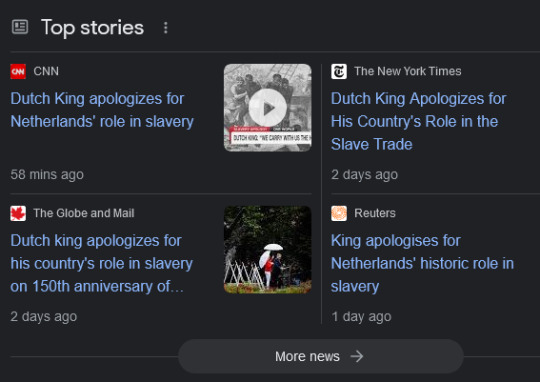

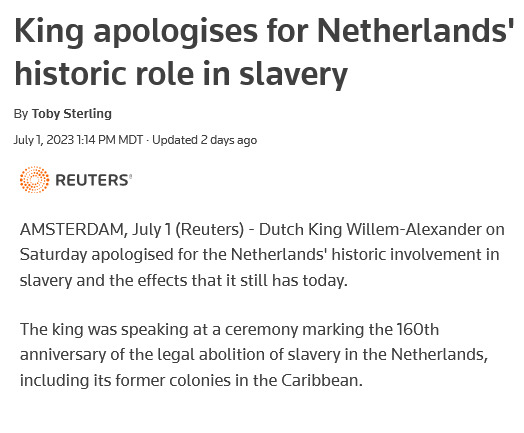
“Dutch King apologizes for Netherlands’ role in slavery.”
The Dutch/Netherlands abducted slaves from West Africa; hosted the Dutch West India Company; operated an extensive profitable sugar plantation industry built on slave labor; and established colonies in the greater Caribbean region including sites at Aruba, Curaçao, Sint Maarten, Bonaire, and the adjacent “Wild Coast” (land between the Orinoco and Amazon rivers, including Guyana and Suriname). Many of these places remained official colonies until between the 1950s and 1990s.
---
Scholarship on resistance to Dutch practices of slavery, colonialism, and imperialism in the Caribbean:
“Decolonization, Otherness, and the Neglect of the Dutch Caribbean in Caribbean Studies.” Margo Groenewoud. Small Axe. 2021.
“Women’s mobilizations in the Dutch Antilles (Curaçao and Aruba, 1946-1993).” Margo Groenewoud. Clio. Women, Gender, History No. 50. 2019.
“Black Power, Popular Revolt, and Decolonization in the Dutch Caribbean.” Gert Oostindie. In: Black Power in the Caribbean. Edited by Kate Quinn. 2014.
“History Brought Home: Postcolonial Migrations and the Dutch Rediscovery of Slavery.” Gert Oostindie. In: Post-Colonial Immigrants and Identity Formations in the Netherlands. Edited by Ulbe Bosma. 2012.
“Other Radicals: Anton de Kom and the Caribbean Intellectual Tradition.” Wayne Modest and Susan Legene. Small Axe. 2023.
Di ki manera? A Social History of Afro-Curaçaoans, 1863-1917. Rosemary Allen. 2007.
Creolization and Contraband: Curaçao in the Early Modern Atlantic World. Linda Rupert. 2012.
“The Empire Writes Back: David Nassy and Jewish Creole Historiography in Colonial Suriname.” Sina Rauschenbach. The Sephardic Atlantic: Colonial Histories and Postcolonial Perspectives. 2018.
“The Scholarly Atlantic: Circuits of Knowledge Between Britain, the Dutch Republic and the Americas in the Eighteenth Century.” Karel Davids. 2014. And: “Paramaribo as Dutch and Atlantic Nodal Point, 1640-1795.” Karwan Fatah-Black. 2014. And: Dutch Atlantic Connections, 1680-1800: Linking Empires, Bridging Borders. Edited by Gert Oostindie and Jessica V. Roitman. 2014.
Decolonising the Caribbean: Dutch Policies in a Comparative Perspective. Gert Oostindie and Inge Klinkers. 2003. And: “Head versus heart: The ambiguities of non-sovereignties in the Dutch Caribbean.” Wouter Veenendaal and Gert Oostindie. Regional & Federal Studies 28(4). August 2017.
Tambú: Curaçao’s African-Caribbean Ritual and the Politics of Memory. Nanette de Jong. 2012.
“More Relevant Than Ever: We Slaves of Suriname Today.” Mitchell Esajas. Small Axe. 2023.
“The Forgotten Colonies of Essequibo and Demerara, 1700-1814.” Eric Willem van der Oest. In: Riches from Atlantic Commerce: Dutch Transatlantic Trade and Shipping, 1585-1817. 2003.
“Conjuring Futures: Culture and Decolonization in the Dutch Caribbean, 1948-1975.” Chelsea Shields. Historical Reflections / Reflexions Historiques Vol. 45 No. 2. Summer 2019.
“’A Mass of Mestiezen, Castiezen, and Mulatten’: Fear, Freedom, and People of Color in the Dutch Antilles, 1750-1850.” Jessica Vance Roitman. Atlantic Studies 14, no. 3. 2017.
---
This list only covers the Caribbean.
But outside of the region, there is also the legacy of the Dutch East India Company; over 250 years of Dutch slavers and merchants in Gold Coast and wider West Africa; about 200 years of Dutch control in Bengal (the same region which would later become an engine of the British Empire’s colonial wealth extraction); over a century of Dutch control in Sri Lanka/Ceylon; Dutch operation of the so-called “Cultivation System” (”Cultuurstelsei”) in the nineteenth century; Dutch enforcement of brutal forced labor regimes at sugar plantations in Java, which relied on de facto indentured laborers who were forced to sign contracts or obligated to pay off debt and were “shipped in” from other islands and elsewhere in Southeast Asia (a system existing into the twentieth century); the “Coolie Ordinance” (”Koelieordonnanties”) laws of 1880 which allowed plantation owners to administer punishments against disobedient workers, resulting in whippings, electrocutions, and other cruel tortures (and this penal code was in effect until 1931); and colonization of Indonesian islands including Sumatra and Borneo, which remained official colonies of the Netherlands until the 1940s.
162 notes
·
View notes
Photo


Ingek72 submitted this interesting modern home in the Netherlands. Look at how it’s stacked like 3 boxes. €1,900,000 ($1,847,081)


Quite a few stairs lead to the front door and pass a deck on top of the garage.


The dining area opens to the deck.

The kitchen is in the middle of the dining and living room areas.


Ultra modern design includes a glass backsplash.

There’s a terrace outside of the living room space.

Closeup of the modern fireplace.

The stairs curve to find a glass wall in the main bd. hall.

The bds. have frosted glass doors.

A tub is in the bd. that opens to a rooftop deck.

Behind the headboard of the bed is a sink.


Down the hall is a 2nd bd. with a door to outside.

The “terrace” is fairly narrow, but you can stand outside at the railing.

The 2nd bd. has a shower.

Down on the ground level is a laundry room.

There’s also a home office- both rooms are part of the garage.


The actual garage.

The home’s name translates as “River House,” and the name is spelled out in the home gym. I think that I would take those letter upstairs.


Look at the grounds- it has a little footbridge over a creek.

And, there’s the river that gives the house it’s name.
https://www.funda.nl/koop/appeltern/huis-42842497-groenedijk-1/%20only%202%20bedrooms%20though/
121 notes
·
View notes
Text







Atlas House, Eindhoven, The Netherlands - MONADNOCK
#MONADNOCK#architecture#design#building#modern architecture#interiors#minimal#house#concrete#house design#modern#contemporary#contemporary architecture#cool architecture#cool houses#brick#brick architecture#colourful#green#windows#square#box#home#interior decor inspo#concrete floor#netherlands#living room#architectural#design blog#cool design
83 notes
·
View notes
Text
This week on The Nordroom
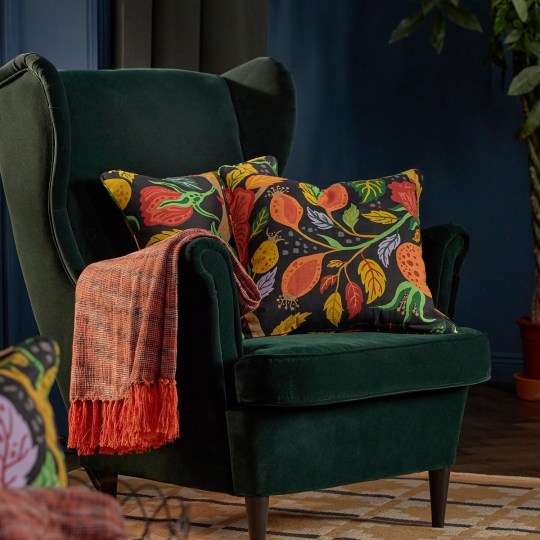
IKEA HÖSTAGILLE: A Fall Collection with Halloween Decorations 2024

The Flint House Kitchen Extension by deVOL

Bold Color Accents in a Dutch Family Home

Light and Modern Spaces in a Small Victorian House
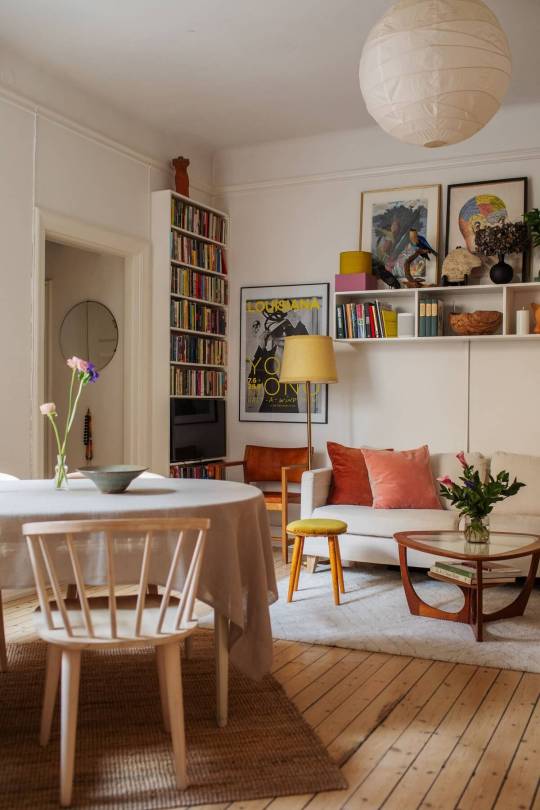
Period Details and Light Rooms in a Scandinavian Apartment

A Modern Duplex Apartment in The Netherlands

A Modern Barn House in the English Countryside
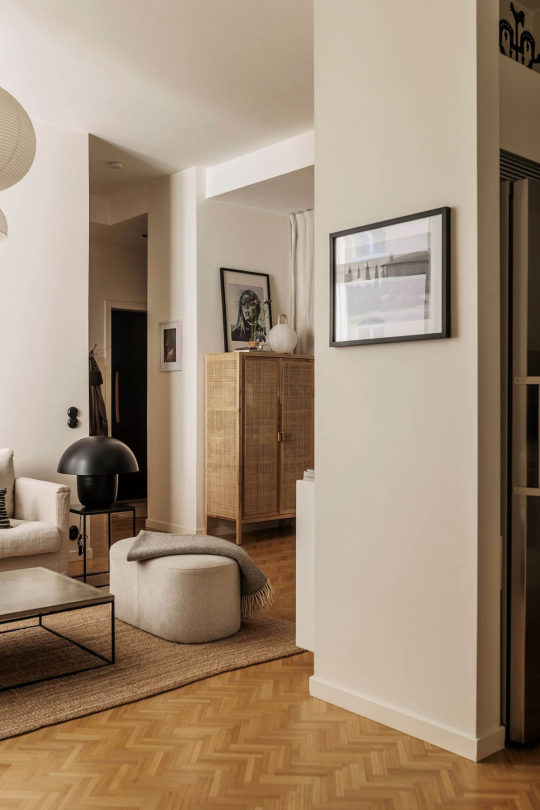
A Serene Modern Home in a Former Factory Building

Modern Interiors in an Architectural 19th Century Building
71 notes
·
View notes
Text

the encounter
➝ a painting, an agent and a crime. sounds good, no?
➝ word count: 3,9k
➝ warnings: descriptions of crimes, reader being clumsy
➝ author’s note: i finally felt safe enough to post this story. it's a more or less alternative universe, since it has some real things (i'd love to know your bets). hope you like it.
It was an ugly, gloomy day in Vienna, and you found yourself sitting in the cafe you tended to frequent these days. As far as anybody knew, and as far as you told anybody, it was a nice place to come and work during the day, so almost every day for the past few weeks, you sat in your usual seat by the window and sipped coffee as you ostensibly worked on something important on your laptop. As far as anybody asked, the cafe was comfortable enough and it was fairly close to your apartment, and you simply weren’t quite as productive when you were working at home. That’s what you told people, along with the fact that you worked in finance.
You weren’t working on anything at the moment, because your mind was elsewhere, and your eyes were fixed on something across the street from the cafe. You were staring at an old antique shop, with a dark green facade and gold lettering across its front window. You were watching the people inside, talking animatedly, trying to imagine what they were speaking about.
— Maria — you heard someone say. The name was familiar, after all, that was the name that was listed in the identity documents that your boss handed to you in a manila envelope a few weeks earlier, along with an investigation report. Hearing the name brought you back to when he was briefing you on the operation, which had been named “Królowa”, a reference to the object of the investigation. You had been assigned to search for information on a triptych painted by the Polish master painter, Jan Matejko, that depicted a procession accompanying the Virgin Mary and the Baby Jesus to a cathedral in Kraków.
The triptych was considered a lost Polish national treasure, stolen from its most recent owner during the Nazi occupation. Previous investigations into its whereabouts dragged on for years, buried in the files of the Europol, based in The Hague, in the Netherlands. When you started working there, almost a decade earlier, the case was stuck on a cold lead about the piece's last owner, Count Hieronim Tarnowski, a Polish aristocrat.
The last documented whereabouts of the triptych was within Montelupi Palace in Kraków, which was owned by the Tarnowski family. However, the palace and all of its contents were expropriated by Nazi command in 1942, before the interior of the Palace was consumed by fire. From then on, there was nothing further documented about the of the painting. It and some other cultural treasures seized by the Nazis were long considered lost by the Polish government and Europol. That is, until one day, you found something that made you dig deeper into the case.
You were doing some research for another art theft case when you found an open thread about Matejko on an art forum. While you were reading praise for the painter's work, you came across a photo posted by a user called Piter1974 that caught your attention.
It was a photo of the triptych, clearly taken with a modern camera given the quality and colors of the image. They contrasted sharply with the images attached to the investigation that you had as reference, which had been taken from pre-war catalogs. The only existing photos of the work were all in black-and-white, taken with early 20th century cameras. You did some cursory checking on the authenticity of the image, and didn't hesitate to print it out. You placed it on your boss’ desk with an air of confidence.
— What is that? — your boss, a burly, perpetually grumpy Frenchman named Romeo, asked.
— It’s Matejko’s triptych.
He looked unconvinced as he cocked an eyebrow.
— Came to show me your Photoshop skills? The colors look nice, but…
— I didn't color this photo.
Romeo blinked.
— Do you mean…
— It's a recent image — you said, proudly — The EXIF data shows that it was taken on October 6, 2022.
— Where did you find this?
— On an internet forum. A user posted this in a discussion thread about Jan Matejko's works.
— You…
— It’s not AI or Photoshop. I checked, Romeo — you replied, smiling — The triptych still exists!
Your discovery led to the case being reopened, with the image being examined pixel-by-pixel for any inconsistencies, and your findings being verified. The EXIF data buried in the picture not only showed the date, but it showed what kind of camera the image had been taken by, which was a high-end professional model popular with archivists and museum curators for taking high-quality images suitable for cataloging.
You felt frustration wash over you. The trail seemed to have gone cold again, after all, how many art galleries were there in the world? It was like you were looking for a needle in a haystack.
But again, fortune smiled on you. While analyzing an old catalog of Jan Matejko's works written by a Polish author, you came across new information about the triptych's whereabouts. According to the catalog’s author, after being confiscated by the Nazis, the triptych briefly reappeared in the 1960s, in the inventory of a well-known antiques shop in central Vienna. Your relief was short-lived when you saw the name of the shop’s owner.
“Of course Bednarczyk is involved in this”, you thought to yourself, letting out a long sigh.
Czesław Bednarczyk was an old acquaintance of the Polish justice system. He had been a notorious smuggler, taking vast amounts of Poland’s cultural treasures and gold abroad, most of it to be sold in his antique shop in central Vienna, on the Dorotheergasse.
Despite the mountain of evidence against him, the antiquarian never faced justice for his crimes, nor did his reputation within the art world suffer. When he died in the late 90s, the funeral was attended by great figures from the industry, all paying their respects to the patriarch's family, who worked to preserve his legacy to this very day.
Bednarczyk's antique shop was taken over by his eldest daughter, Elisabeth. She was known for being one of the leading experts on Viennese porcelain, which kept her from being a major suspect. However, you thought, that didn't mean the place couldn't be involved in some way, as other Matejko pieces had been sold by the Bednarczyks over the years. And so, you went to Vienna with a false identity and a single objective: find the triptych.
After arriving in the city and settling into the apartment that would be your base, you tried to investigate the surroundings of Dorotheergasse, the narrow lane where the antique shop was located. In short order, you found the perfect place to monitor movements in and out of the shop without raising any suspicion — a cafe next to the Jewish Museum across the street.
— Maria — the voice repeated, making you wake up from your thoughts. You glanced over your shoulder, finding the friendly smile of Kristina, the cafe's barista — Is everything okay?
— Yes, everything’s fine — you replied quickly, fumbling to hide the fact that you had forgotten that was the name you’d given to the waitress — Why?
— Oh, you… Called me over to place your order, but when I asked you what you wanted, you didn't say anything...
You felt your own cheeks heat up.
— Sorry, Kristina, I was distracted…
— By the antique shop?
You were apparently being too obvious. You wished the ground would swallow you whole.
— Well, no… Not exactly…
— Oh, I’m not surprised. — Kristina laughed — When you said you had just moved to an apartment nearby, I sort of figured you had an eye for art and antiques.
— But, how?
The barista chuckled.
— I mean, you’ve seen the kind of people that come in here. It’s only old people or people that are crazy about art, and you’re obviously not old.
You smiled, trying to hide your discomfort at feeling so transparent.
— I do like art — you lied — My parents had a lot of pieces at home, like sculptures, porcelain...
— Oh, that shop has a ton of those things.
You raised your eyebrow.
— Have you ever been inside?
— Yes. I got curious about it and went after work one day.
— Did you talk to anyone there?
Kristina was clearly taken aback by your interest.
— Oh, yes, I talked to a man, he…
— Alexander? — you asked, taking a few seconds to realize that, in your eagerness to find out more about the Bednarczyks, you were close to showing your hand.
— No, his name was something else — she replied, with suspicion on her face — Who’s Alexander?
In truth, you knew that Elisabeth had a son named Alexander. According to the case’s dossier, he was a specialist in contemporary art and responsible for numerous sales of works to foreign galleries and museums. If the triptych had left the antique shop heading abroad, it likely would have passed through Alexander's hands.
— Well, like I said, my parents like art and I remembered they bought a few pieces from a shop in Vienna run by a man named Alexander — you said, trying to cover your tracks — I thought it could be him, but I think it's unlikely, come to think of it. After all, how many art and antique shops are in a city this size, right?
After staring at you for a few seconds, Kristina smiled.
— Unlikely, maybe, but not impossible. I imagine the art world isn’t a very big one, after all.
You went back to focusing on the antique shop. You had noticed some movement near the door and you were trying to pay attention to whoever was leaving, when Kristina cleared her throat.
— Yeah? — you muttered.
— Do you still want something?
Looking at the table, you noticed that your espresso cup was empty, as was the plate full of crumbs from the chocolate cake you had devoured after lunch.
— I think another espresso — you replied. With a nod Kristina walked away from your table, while you looked again at the door of the antique shop as two blonde women came out of the shop’s door. Both of them were talking animatedly and had boxes in their hands.
Just then, you’d decided you’d spent enough time over the past few weeks watching and waiting — you had to see what was inside.
The next day, the plan was already drawn up in your head. You would go into another antique shop in a different part of Vienna and buy something made of porcelain, something that seemed to be antique. And then, you would go into the Bednarczyk’s shop to try and have it appraised. It belonged to your mother, you would tell them, and you wanted to find out what they could tell you about it and see if it could be restored. Anything to buy more time.
You’d let the staff at the shop talk to you, you knew what questions to ask to not seem like you knew nothing about the pieces, but what to avoid asking to not show that you knew too much. While you were talking to them, whoever they were, you would try to work in a way to ask about any Matejko pieces they knew of.
Your plan was hastily arranged, but it seemed like it should be perfect.
You found another antique shop in Ottakring, across the city, and bought the first porcelain piece you spotted that you knew was old enough to seem like a treasured family heirloom. You thought it would be a good idea to stop by the cafe first and have an espresso to settle your nerves before heading into Bednarczyk’s.
You walked down the street to the direction of the antique store with the box containing the little sculpture in your hands, confident this would be a big step forward in the investigation of the tryptich’s whereabouts.
As you were glancing toward the shop’s entryway, you let your attention slip for a moment, crashing into the back of the man who was walking ahead of you. The box in your hand slipped and fell toward the ground, the muffled tinkling of shattering porcelain coming from inside the box. You immediately sank to the ground and lifted the flaps on the top of the box.
— No, no, no, fuck — you said, seeing the ballerina you bought reduced to a pile of shards.
— Shit — the man said from above you. When you looked up, you realized that you had stumbled into a man with dark hair and brown eyes, who were fixed on what was once a small porcelain statue — I'm sorry, I didn't see you coming in behind me…
— No, it's okay — you murmured, trying to hide your displeasure at having broken the piece. You had chosen the porcelain ballerina precisely because you knew that it was old enough to be of interest to Elisabeth. However, you couldn’t exactly get her to appraise a pile of dust — Isn’t a big deal...
— From your reaction, it seemed like something important — the man said, as you closed the box quickly and stood up — I’m so sorry. I hope it wasn’t a family heirloom.
You looked up at him, pressing your lips together as you realized how tall he was. “Focus… Maria”, you thought to yourself, feeling your face heat up. You couldn't let your cover identity slip.
— Yeah, it was. I had brought it to see if there was somewhere that could appraise it, maybe restore it, but… I don’t think there’s much to be done about it now.
Looking at the box, the man seemed to think for a few seconds, before looking up at you again.
— Well, if you want, I can find something else to give you instead. I’ll pay for it.
— I don’t…
— That won't replace the sentimental value, no, but it's the least I can do, considering your little ballerina is broken because of me.
You hesitated for a few seconds. You didn’t want to involve another person in your investigation, especially an innocent bystander that made you feel a strange heat in your chest and a strange flush in your cheeks. However, before you realized it, you were following him down the street, the box with the porcelain shards in your hands, into the front door of the Bednarczyks' antique shop.
He opened the door and motioned politely for you to walk in first, which you did, unable to hide the shy smile on your face. The man closed the door behind him as you approached one of the shelves. It was stocked with a huge assortment of miscellaneous knicknacks - silver candelabras, ceramic vases, sets of different glasses and jars, all polished and carefully arranged. Your eyes landed on a velvet box on one of the middle shelves, and you couldn’t resist the compulsion to step forward and carefully tilt open the lid, trying to see what was inside.
— It's a set of silver flatware — a female voice said behind you. You turned around with a start to see a short, blonde woman with kind brown eyes staring at you. She smiled — Sorry, I didn't mean to scare you. Mr. Wolff asked me to come assist you.
— Mr. Wolff? — you asked, confused.
— The gentleman who came in with you.
You were still confused, wondering how she knew the other customer’s name.
— By any chance — you started, stopping when you felt someone touch you shoulder.
— Ah, you found Petra, excellent — the man, apparently Mr. Wolff, said — Petra, could you show us the porcelain?
The woman nodded and directed you to another set of shelves, chatting about , the woman guided you between the shelves, chatting about the store's new arrivals. However, your mind was occupied with trying to remember if you’d ever seen the name Wolff anywhere in the case files. The man seemed to be too familiar with the staff to be just another customer. You remembered reading about Elisabeth, her son, Alexander, and Alexander’s wife, Amy. However, you didn't remember any man with the surname Wolff.
— Here is our selection of porcelain. I'll leave you to choose what you would like — Petra said, with a smile.
— Thank you very much, Petra. As soon as we choose, we will call you.
With a nod, Petra walked away, leaving the two of you alone in front of the shelves filled with figurines, cups, teapots and porcelain vases. After a few seconds of silence, you finally looked at the man next to you.
— Mr. Wolff, is it? — you asked, the tone of your voice causing a smile to appear on his lips.
— Well, yes. Torger Wolff. But you can call me Toto.
Something about what he said made you smile.
— Toto, like the dog in The Wizard of Oz?
— I would say like Toto Rina, the Italian mafioso, but most people think of the dog first — Toto said, without taking his eyes off you — And you, what's your name?
You hesitated for a few seconds.
— Maria.
— Just Maria?
— Maria Bauer.
Toto chuckled.
— Ah, a fairly common name, no? — he asked. “It had to be something from the idiots in the operations department”, you thought to yourself, giving a wry smile.
— My parents weren’t the most creative…
— In my case, they were too creative — he said, looking at the shelf again — I suppose you’re not not from Vienna?
His question made you swallow hard.
— No, I'm not. I moved here not long ago. How did you know?
— Your accent — Toto replied — I'd say you're from the south, maybe. Graz?
— Klagenfurt — you said. That’s what was in your identity document. You hoped he wasn't familiar with the accent there, since you were sure that the Dutch and English you were used to speaking on a daily basis with your co-workers was present in the way you slurred some syllables.
— But you've lived abroad, haven't you?
— Why do you ask?
— Your accent doesn’t sound like a Southern accent. I have an acquaintance from near there, but his accent is a bit different.
— My mother is Dutch — you lied, almost in an attempt to stop that interrogation — So, I grew up listening to her accent and ended up picking it up.
— Ah, yes, I understand — he said, giving a gentle smile.
Turning your attention to the shelf, you tried to focus on the china in front of you, trying to decide which piece would be the most similar to the one he had broken. Not that it mattered much, but one did catch your eye. It was a figure of two people - a man and a woman, sitting next to a column, with the woman holding a rose and the man holding a basket of flowers on his lap. It was romantic, and oddly endearing.— Did you like this one? — Toto asked.
— Yeah — you replied, your fingers brushing the top of the porcelain column, where there was a small hole to hold a few flowers — It's very beautiful.
— I agree.
— With such a renowned expert curating the collection, it's not surprising — you said, taking the porcelain figure in your hands.
— Oh, do you know of Elisabeth? — he asked. You glanced over to Toto to find that he had a curious expression, like something you said made an impression.
Maybe you’d already said too much.
You’d betrayed the fact that you were not from Vienna and had recently moved to the city, leaving you no acceptable excuse to explain how you knew who owned the shop you were in. It wasn’t as if she was well-known outside of very specific Viennese society and academic circles — No, I don't know her — you said, giggling nervously.
— So how do you know she curates the porcelains here?
— Well, like I said, I recently moved and I'm still cleaning up my apartment, so I'm working from the cafe across the street — you lied, trying to sound as calm as possible — And, one day, I noticed the antique shop across the street and looked up some information about it online. My parents collect art - mostly these porcelain figures, so I thought I’d bring in one of their older pieces to have it appraised and restored, since she seemed like the best person to do it.
— Of course, the internet — he said, laughing — What's not on the internet nowadays, right?
— Right? You can find anything — you smiled, feeling your heart pounding. He seemed to buy it, but you couldn’t guarantee that you’d be so lucky next time.
After asking if you liked the piece you were holding and calling Petra to confirm your choice, Toto asked you to stay there, before heading towards the counter at the back of the shop together with Petra.
Watching him talk to Petra, you started feeling guilty. You had only just met Toto and you already felt terrible about lying to him, which made you feel even worse, as feeling such strong emotions about telling lies was an occupational liability for you. But still, he had nothing to do with the investigation beyond knowing who Elisabeth was, and ostensibly frequenting her family’s antique shop. He certainly wasn’t a person of interest, so you could only conclude that he was one of her wealthy patrons. “He must be rich”, you thought, watching him scribble something on a piece of paper and hand it to Petra.
Perhaps, in other circumstances, you could get to know each other better. It was crazy, you thought, to be imagining a future with a man you knew nothing about and had just met mere moments ago, but you couldn’t help it as you looked at the way he smiled at you. It was a sweet, warm smile, and you’d never met anyone else you felt a connection with so immediately. It was the same smile he gave you once more as he handed you an elegant box that Petra had given him. “What a handsome son of a bitch”, you thought, giving him a small smile.
— Here — Toto said, handing you the box — I know it's not a one-for-one replacement, but it's my way of apologizing for the accident earlier.
— It’s no problem, really. You could very well have ignored what happened and kept walking, so…
— No, I don’t think that would have been — he murmured, eyes fixed on yours. That intensity of his gaze on you made your own cheeks feel hot.
— What do you mean by that? — you asked, giggling nervously.
— It would be impossible to ignore you — Toto said, seeming to realize the effect of his own words on you — I could never just walk past you.
The room filled with silence that stretched out long enough for you to think of a million scenarios in which you would end up with your lips pressed against his.
— Well, I'm going to take this home — you finally said, taking a brief look at the box — Thank you for your kindness, Toto.
— It was the least I could do, Maria — he replied with a smile, putting a peculiar emphasis on your name.
Giving one last wave, you turned around and left the antique shop feeling like you were floating. However, nothing compared to the feeling that came over you when you opened the box and found a note on the bubble wrap that surrounded the delicate piece of porcelain.
— I'd love to see how it looks on your shelf — you read quietly, realizing that Toto had written his phone number below his message while Petra was wrapping the figurine.
You dug into your purse and pulled out your phone, but started feeling guilty again. You were in Vienna for work, not to flirt with strangers. You were dealing with dangerous people and getting involved with more people meant additional risk, not only for them, but for you and your career.
“Well… one photo of my bookshelf probably won’t hurt anyone”, you thought, before saving the number on your cell phone.
#toto wolff#wlffog#formula 1 fic#f1 fic#f1 fanfic#formula 1 fanfic#formula 1 x reader#toto wolff x reader#f1 x reader#formula 1 x you#toto wolff fanfic#toto wolff fluff#formula one fanfic#formula one fic#ocwlff
66 notes
·
View notes
Text
Eurovision 2024: my experience as a fan
One thing about me is that I love Eurovision. I have all the winners plastered on my door at home, I can beat anyone and everyone at European geography. Each year for a week in May, I am people’s go to for anything and everything Eurovision, from explaining the big five to promoting my favourite songs. I willingly get up at 5am to tune in live, I have written two academic essays on Eurovision, and both essays have a sense of passion running through them where you can tell I love the topic- may or may not have been called out once on that. I knew so much about the topic that neither essay required much research. When I lived in the Netherlands, I attended Het Grote Songfestivalfeest, probably killing my seat neighbours with my singing and poorly articulated Dutch when De Diepte came on. As well as that, my friends and I took a trip to Rotterdam and visited where the contest was held in 2021. Having me, an Australian, alongside a Dutch person and a Greek, exploring Rotterdam highlighted to me exactly what Eurovision should be about. Unity.
Being in a room of Eurofans gave me joy that is unexplainable. I just remember realising, ‘hey I found my people’
However, I always knew ESC 2024 was going to be a hard watch for me, even before the boycotts begun. About a year ago I went through a massive friendship breakup with one of my closest Eurovision friends, and their villianisation of me meant that watching with them wasnt an option. I didn’t want to watch alone. That’s all I will say on that. I had a year to deal with that, anyway, and even when people were boycotting the event after October 7th, I thought, theres actually no way that Israel is actually competing this year. They surely will send something too political and get dq'd, right? Most of the knowledge I have of Palestine and Israel comes from my year 12 modern history class, which as my friend and I discussed today, was taught neutrally- and it’s not in Israel’s favour. I was there when Hatari spoke out in 2019 and did the banners, and I remember the shock and understanding what a big deal this was.
I toyed with the idea of boycotting myself. I had my reasons. I auditioned for a play, which didnt work out for me, as I was too distracted by Eurovision week to care. I was less invested in Eurovision as a whole, and I would get sleep. But in the end, I decided not to. My friend (who found out I liked Eurovision after I bitched about my ex friends not enjoying that I had other interests asides from Taylor Swift) was already coming around to watch. I decided my mental health came first, before boycotting and before being an activist. If I could save this one piece of my mental health, I would be fine. Stupid delusional me, well she had hope. I wanted to support Joost, and the other artists who were stuck in this shitshow of a year. I staunchly boycotted Isreal’s song, I have only heard it in full once, and that was against my will. I even blocked her on Spotify.
I looked at it all positively- this all meant I was going in more blind than ever. I bought my 2024 CD, but I also broke a lot of traditions- I didnt do my predictions like I do every year on my whiteboard, I didnt film the first semi qualifications with the caption ‘im in spain’ and put it on my story, and I hardly watched the NFs. I liked Eurovision, but this year, with all going on, I felt guilty and ashamed. I have been ashamed of being a eurofan before, but not on this level. I felt like I was trapped in a glass box, kicking and screaming at the ebu but they had airpods in. The answer was so obvious. Ban Isreal, like you did with Russia. People were harassing artists for competing, especially Olly, who I realised had no choice in the matter anyways. I ended up thinking “just get through the week, soon it will be over, and you’ll have fun with your friend.” I have never wanted Eurovision week over in my life. I just wasnt excited. Europapa basically became my ride or die, built upon my love for the Netherlands, and the genuine good vibes of the song. Joost was charismatic, and the song had a nice story. Another one of my friends, who realised I was eurofan after I posted a video on my story where you could see my Dowue Bob poster (I have my reasons for keeping it), found a watch party and it was free. She had her drivers license so she could get us there, and my other friend and I agreed. It would be fun, I would bring my Dutch flag and my orange beanie and wear my Sam Ryder shirt.
The first semi happened. My friend came over, we slept on the couch. I enjoyed myself, the qualifiers werent shocking though and I guessed 9/10 of them. It was pretty mid, but it was fun. The only issue was Poland being robbed and the Australian commentary on SBS being dicks to Portugal, which they backtracked in the final. It was insufferable, but the worst was yet to come.
The second semi. I was so excited to see Joost perform and bonded with my Dutch coworker over him and his song, which honestly was beautiful. If she didnt know how much I love the Netherlands before, she does now. I did notice that when Israel qualified, all the sickness in my stomach just exited the room, as the worst that could happen, happened. But sadly, I knew it would happen. Seeing the videos, however, of Palestine protesters and the booing and shouting, despite attempts to silence us, was beautiful. It showed exactly where the fandom stood, what we thought. And my mum was even happy about Israel being treated like bullshit.
And then shit started to go down.
The second semi press conference. The kaarija video. Joost being followed around for propaganda content by Israel. Joost’s “why not” and throwing the Dutch flag over his head. Marina falling asleep (queen). Bambi being dehumanised by Israel’s delegation and asshole of a commentator. Zionists kept making excuses and I got a few threats on TikTok of all places for supporting a bully manchild. Well, fuck you, at least I am not suporting genocide. It was a mess. My friend asked me for my opinions on the qualification while at work and i basically told her I didn’t want to talk about it. I looked so sad on break my coworker offered me a banana.
“Treat Eden Golan as human! She’s only 20” I wondered, how could I? How could I treat someone as human when they were basically a puppet, a face for a genocidal nation. How could I do that when that same genocidal nation was tearing apart the one thing I loved? Her delegation certainly didn’t treat Joost Klein as human; certainly just as another tool they could use to promote their propaganda machine. I felt sick. He wasn’t the only one. I was so proud of Joost, and I will always be proud of him, I think. What he did during the press conference after semi 2 took guts. Normally I would be pissed at a delegation getting mistreated like this, but not today. As far as I was concerned, this was good riddance. Get the fuck out, you’re not wanted here.
On Saturday, I started to realise I had this heavy feeling in my chest and it wasn’t leaving. I felt on edge, and yet I was a world away in Australia. I listened to “I can do it with a broken heart” fifty times on my way to work that day, confident that maybe I could power through this matinee shift without cracking. My favourite thing in the whole world was falling apart before my eyes, and it was easily avoided. I felt sick at work, there were points when I was thinking “I can’t do this.” But I could. I would. I would get through this shift. I messaged one of my friends in NL asking her how she was and she said she also wasnt having a good time, to which I confessed not wanting to get out of bed that morning because I was so sick with discomfort.
People were continually asking my thoughts, if I enjoyed the shows, the memes were sent and I had to put on a brave face because crying over a song contest is stupid and im a coward and hate being an outspoken activist.
The final straw for me was Joost Klein getting disqualified. This would have been a devastating blow for me no matter which nation it was, but it being the Netherlands, the one country I love more than anything else, the one song that was basically my ride or die in this shitshow of a year: well it felt personal. It showed the double standards of the EBU- how could an incident, hardly worth a fine, get Joost kicked out of ESC when Israel waltzed in with a smugass grin and a kill count. If it was about Joost's parents, I hope he hit them hard. the misleading information, the lack of transparency, and AVROTROS's discomfort over the whole ordeal was the cherry on the cake and really, actually showed me in full colour who the EBU were and that they didn't give two shits, bending the rules for Eden and using everyone else as scapegoats. That Joost, or any of the other artists were not allowed to have boundaries. Instantly I messaged my friend, and went “I am not fucking going to this watch party.” She agreed with me, the vibes would be off and probably zionist. My other friend, who was staying the night, was still keen to watch ESC. Instead of going to the livestream in Hurstville, we all came to mine at 5am and we elected to watch together. To finish what we started. As my friend said, “it could be the last one.”
I saw myself witnessing the death of Eurovision. All because someone wouldnt fucking kick out a country. When I woke up in the morning, I saw that Bambi had posted a statement saying they had issues with Israel and the delegation, and even the EBU fully admitted that Israel had broken rules. Yet where was the punishment?
I will confess the 5am start time hurt more this time around. Normally I would be bounding down the stairs, box of chips in hand, and excited to see the memes. Today, it just hurt. Dancing around to Europapa didn’t hide the emptiness in my soul about the disqualification, about the double standards enacted by the EBU this year. The interval acts were mid. Petra talking about the rules, saying shit like “it’s apolitical” stung with irony I had never felt before. I put on a brave face and I had as much fun as I could but in reality, I was sad and angry. Wishing I had gotten into that play. That I had the guts to boycott and explain to people why. That Joost wasnt disqualified for shit Eden Golan would have gotten away with.
After the show, I felt empty. Switzerland won, and congrats to them obviously, I like The Code. But after the shitshow of this week, all I felt was free and relieved. Israel still came top 5 and it confirmed what was sickeningly true. People still support Israel. People were still pulling the “Croatia robbed” game, unaware how tone deaf that feels in the current circumstances. It didn’t matter who won, as long as it wasn’t Israel, but it never felt like Israel lost. All I wanted to do was cry. My friend was showing me Eurovision memes probably unaware that I had been through the worst Eurovision of my life, and just wanted to cry and be left alone. No hate to her obviously but I was fucking trying to hold it together all morning, but I couldn't express my emotions on the matter. I hope AVROTROS sue the shit out of the EBU. I hope Joost gets a hero’s welcome home in the Netherlands. I hope past artists speak out. I hope Isreal gets banned.
I will be celebrating the small wins this year. I will be streaming the artists that stood up to the ebu, streaming the ones that spoke out, and of course, continuing to support Joost Klein. I will never forget watching Ukraine sail past Israel in the televote, a win of itself. I am thankful to those in the arena that spoke out against the EBU and booed both Israel and Osterdahl. To those who smuggled in flags, to those who refused to be silent. I will get over this, I will, but seeing the outcome of this week leaves little joy. I hope this isnt the end of Eurovision, but wherever we go now, I think a part of me did die this week.
#this ended up being 2000 words but i needed it out and off my chest. i needed to share it. i felt betrayal as a eurofan#i have just had such a brave face all week and i can't with this thing i used to love#at least i have therapy content#honestly#i just want to talk about how awful this year was from the perspective of a fan and trust me most of the fandom is wanting the ebu's demise#i hope they learn but they wont#if you are fucking rude about this ill block you on sight#and if you are a zionist#well fuck you too#fuck eurovision#eurovision 2024#eurovision#fuck the ebu
28 notes
·
View notes